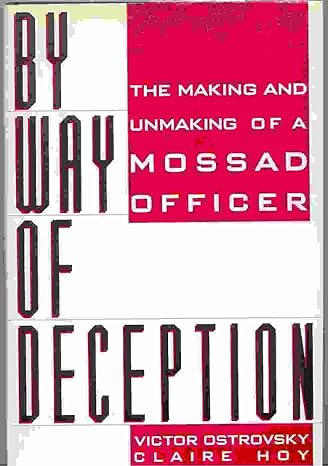By Way of Deception
 ISBN: 978-0312056131
ISBN: 978-0312056131
There are a handful of books in the world that a person should read if they think they have an idea of what the world is all about. Ostrovosky’s book is one of those reads. It is not an especially new book as it was first published in 1990. There was a coordinated effort, however, to silence it. The reason for this becomes clear once it is understood that the subject matter concerns Israel’s intelligence agency–The Mossad.
Ostrovosky, the book’s subject, is a former Mossad ‘katsa’ or intelligence officer. He is recruited by the Mossad and at first is delighted to be selected for such an elite unit. As he progresses upwards in the ranks, however, he discovers that he fundamentally disagrees with how the agency runs without any apparent oversight. In some instances, the agency is celebrating pool parties with rampant sex within those who work in the organization. In others, it concerns an assassination hit that gets messy. In still other situations, the problem becomes a chain of command and crucial information gathered in the field and whether to report these things to those with authority. In these scenarios, the information, though vital, is puzzlingly not always welcome, and one such instance occurs that leads to Ostrovosky dropping out of Mossad itself.
The seeds of Ostrovosky’s disaffection are evident, however, well before we arrive at the spot where he is “burned” by his higher-ups. The problem it seems, is that Ostrovosky is thinking a little too much for the desires of the agency. He is not going to be content to simply accept a paycheck and do what he is told. He is also not a fan of the abuses of power he sees within the organization.
Reading through the book and remembering many of the events of the 70’s through the 90’s was interesting enough from the perspective Ostrovosky presents with the help of his writer, Claire Hoy. A question that occurs during the reading, though, is how much oversight should an agency have, and how much of it is an hindrance? Does oversight make a difference, really, within any organization that has sufficient power to do certain acts or does it simply create that many more people complicit in ‘covering-up’ things that they do not wish known?
As the subject matter here is the Mossad, we have an inside view to the abuses and perhaps more tellingly someone is still around to tell them. There are, however, many other intelligence agencies in the world without such witnesses left to ‘blow the whistle’. It was not that Ostrovsky got to blow the whistle without consequence to himself. He had to apply his own training to keep from getting kidnapped and likely killed. The fact that he is still alive, though, means somebody, somewhere decided he should be–specifically with the abuses he outlines in this book.
It is a hard problem to solve, as if you are a country and you do not play this game, you are a victim of it by other countries which are willing to pursue it. It seems at certain official levels throughout the world, there are those who lack any kind of authority to reign in their activities. It is not a uniquely Israeli issue.
A different though related question is what to do about evil existing in the world when you happen to be a nation or country? How much of it do you fight on its terms, versus how much of it do you not indulge?
There were some amusing anectdotes in the book concerning the brazen plans that were thwarted. At one point, the PLO wishes to purchase a load of weapons with the stated aim of harming Israel only to wind up with crates of raisins instead. At other times the training exercises feature the need to appear on a balcony by some means or another and the plans the recruits implement are quite ingenious and humorous.
The disturbing content, though, far outweighs the amusing anectdotes. There is a fellow who seems quite eager to use a kind of assasination glove that removes a person’s head from their shoulders relatively easy and quiety. Another person has a “hit” go wrong and has to kill two people in a car to complete his mission, but is concerned only with how long it is going to take because he wants to get something to eat. The blood is certainly cold. Of course, to have any other kind of blood in that world is probably the same as either not being in that world for long, or not being in THIS world entirely!
The thing the book does well is that it fills in a lot of blanks concerning such historical events as Iran-Contra and the Munich Olympic bombings. It is, without a doubt, a fascinating read. It is also, troublingly, full of foreshadowing as when the book is released the date of September, 11th in 1990 makes a guest appearance as the date the court tries to stop the book from being published. Some nightmares announce their presence well before they occur it would seem–or maybe there is more to all those events than is still generally known. Who will the next Ostrovsky be and what perspectives will they have to offer?!
